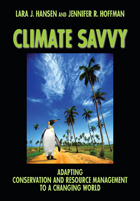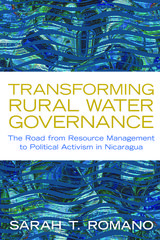3 books about Resource Management

Climate Savvy
Adapting Conservation and Resource Management to a Changing World
Lara J. Hansen and Jennifer R. Hoffman
Island Press, 2010
Climate change demands a change in how we envision, prioritize, and implement conservation and management of natural resources. Addressing threats posed by climate change cannot be simply an afterthought or an addendum, but must be integrated into the very framework of how we conceive of and conduct conservation and management.
In Climate Savvy, climate change experts Lara Hansen and Jennifer Hoffman offer 18 chapters that consider the implications of climate change for key resource management issues of our time—invasive species, corridors and connectivity, ecological restoration, pollution, and many others. How will strategies need to change to facilitate adaptation to a new climate regime? What steps can we take to promote resilience?
Based on collaboration with a wide range of scientists, conservation leaders, and practitioners, the authors present general ideas as well as practical steps and strategies that can help cope with this new reality.
While climate change poses real threats, it also provides a chance for creative new thinking. Climate Savvy offers a wide-ranging exploration of how scientists, managers, and policymakers can use the challenge of climate change as an opportunity to build a more holistic and effective philosophy that embraces the inherent uncertainty and variability of the natural world to work toward a more robust future.
In Climate Savvy, climate change experts Lara Hansen and Jennifer Hoffman offer 18 chapters that consider the implications of climate change for key resource management issues of our time—invasive species, corridors and connectivity, ecological restoration, pollution, and many others. How will strategies need to change to facilitate adaptation to a new climate regime? What steps can we take to promote resilience?
Based on collaboration with a wide range of scientists, conservation leaders, and practitioners, the authors present general ideas as well as practical steps and strategies that can help cope with this new reality.
While climate change poses real threats, it also provides a chance for creative new thinking. Climate Savvy offers a wide-ranging exploration of how scientists, managers, and policymakers can use the challenge of climate change as an opportunity to build a more holistic and effective philosophy that embraces the inherent uncertainty and variability of the natural world to work toward a more robust future.
[more]

Landscape Ecology and Resource Management
Linking Theory with Practice
Edited by John A. Bissonette and Ilse Storch
Island Press, 2002
Landscape Ecology and Resource Management bridges the gap between the science of landscape ecology and on-the-ground land and resource management, relating the theory and empirical research within landscape ecology to the practical needs of resource managers. It offers both a conceptual foundation of applicable and operational theory and case-study examples that address ways in which political, economic, and social factors influence the use of landscape ecology and other data-based science around the world.Contributors focus on links between theory and practice, between small-scale and large-scale, and between humans and nature. Specific linkages examined include:landscape patterns and biological realitytop-down effects and organismsthe indicator species concept and conservation effortsthe concept of fitness landscapes and the behavior and distribution of animalsbody mass patterns and wildlife conservationChapters feature examples of interactions between people and landscapes in boreal, central, and Mediterranean Europe; northern Australia; and Eastern Africa; along with case studies from central Europe, North America, and South America that show how theory and application can be linked in a variety of situations with varying management constraints.Landscape Ecology and Resource Management is the first book of its kind to focus on the linkages between the theory of landscape ecology and the practice of resource management, and will play an important role both in advancing landscape ecology as a science and in incorporating its ideas into management efforts.
[more]

Transforming Rural Water Governance
The Road from Resource Management to Political Activism in Nicaragua
Sarah T. Romano
University of Arizona Press, 2019
The most acute water crises occur in everyday contexts in impoverished rural and urban areas across the Global South. While they rarely make headlines, these crises, characterized by inequitable access to sufficient and clean water, affect over one billion people globally. What is less known, though, is that millions of these same global citizens are at the forefront of responding to the challenges of water privatization, climate change, deforestation, mega-hydraulic projects, and other threats to accessing water as a critical resource.
In Transforming Rural Water Governance Sarah T. Romano explains the bottom-up development and political impact of community-based water and sanitation committees (CAPS) in Nicaragua. Romano traces the evolution of CAPS from rural resource management associations into a national political force through grassroots organizing and strategic alliances.
Resource management and service provision is inherently political: charging residents fees for service, determining rules for household water shutoffs and reconnections, and negotiating access to water sources with local property owners constitute just a few of the highly political endeavors resource management associations like CAPS undertake as part of their day-to-day work in their communities. Yet, for decades in Nicaragua, this local work did not reflect political activism. In the mid-2000s CAPS’ collective push for social change propelled them onto a national stage and into new roles as they demanded recognition from the government.
Romano argues that the transformation of Nicaragua’s CAPS into political actors is a promising example of the pursuit of sustainable and equitable water governance, particularly in Latin America. Transforming Rural Water Governance demonstrates that when activism informs public policy processes, the outcome is more inclusive governance and the potential for greater social and environmental justice.
In Transforming Rural Water Governance Sarah T. Romano explains the bottom-up development and political impact of community-based water and sanitation committees (CAPS) in Nicaragua. Romano traces the evolution of CAPS from rural resource management associations into a national political force through grassroots organizing and strategic alliances.
Resource management and service provision is inherently political: charging residents fees for service, determining rules for household water shutoffs and reconnections, and negotiating access to water sources with local property owners constitute just a few of the highly political endeavors resource management associations like CAPS undertake as part of their day-to-day work in their communities. Yet, for decades in Nicaragua, this local work did not reflect political activism. In the mid-2000s CAPS’ collective push for social change propelled them onto a national stage and into new roles as they demanded recognition from the government.
Romano argues that the transformation of Nicaragua’s CAPS into political actors is a promising example of the pursuit of sustainable and equitable water governance, particularly in Latin America. Transforming Rural Water Governance demonstrates that when activism informs public policy processes, the outcome is more inclusive governance and the potential for greater social and environmental justice.
[more]
READERS
Browse our collection.
PUBLISHERS
See BiblioVault's publisher services.
STUDENT SERVICES
Files for college accessibility offices.
UChicago Accessibility Resources
home | accessibility | search | about | contact us
BiblioVault ® 2001 - 2024
The University of Chicago Press









